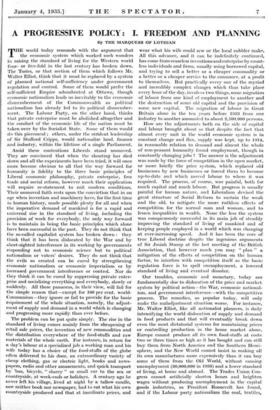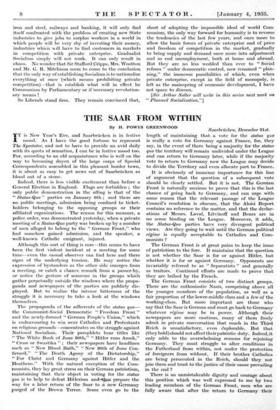A PROGRESSIVE POLICY: I. FREEDOM AND PLANNING By THE MARQUESS
OF LOTHIAN THE world today resounds with the argument that the economic system which worked such wonders in raising the standard of living for the Western world four- or five-fold in the last century has broken down. The Tories, or that section of them which follows Mr.
Walter Elliot, think that it must be replaced by a system of planned national self-sufficiency under government regulation and control. Some of them would prefer the self-sufficient Empire adumbrated at Ottawa, though economic nationalism leads us inevitably to the economic dismemberment of the Commonwealth as political nationalism has already led to its political dismember- ment. The Labour Party, on the other hand, thinks that private enterprise must be abolished altogether and the conduct of the economic life of the nation must be taken over by the Socialist State. Some of them would do this piecemeal ; others, under the strident leadership of Sir Stafford Cripps, would nationalize land, finance and industry, within the lifetime of a single Parliament.
Amid these contentions Liberals stand unmoved. They are convinced that when the shouting has died down and all the experiments have been tried, it will once more become obvious to all that the way forward for humanity is fidelity to the three basic principles of Liberal economic philosophy, private enterprise, free trade and social reform, however much their application will require re-statement to suit modern conditions. Their unmoved faith rests upon the conviction that in an age when invention and machinery have, for the first time in human history, made possible plenty for all and when the imperative demand of mankind is for a rapid and universal rise in the standard of living, including the provision of work for everybody, the only way forward is to maintain in being the basic principles which alone have been successful in the past. They do not think that the so-called capitalist system has broken down : they think that it has been dislocated by the War and by short-sighted interference in its working by governments responding not to economic science but to political nationalism or voters' desires. They do not think that the evils so created can be cured by strengthening economic nationalism or economic imperialism or by increased government interference or control. Nor do they think it can be cured by suppressing private enter- prise and socializing everything and everybody, slowly or suddenly. All these panaceas, in their view, will fail for the simple reason that—except for 100 per cent. world- Communism—they ignore or fail to provide for the basic requirement of the whole situation, namely, the adjust- ment of supply and demand in a world which is changing and progressing more rapidly than ever before.
The problem can be put quite simply. The rise in the standard of living comes mainly from the cheapening of retail sale prices, the invention of new commodities and the distribution everywhere of the food-stuffs and raw materials of the whole earth. For instance, in return for a day's labour at a specialized job a working man and his wife today has a choice of the food-stuffs of the globe often delivered to his door, an extraordinary variety of cheap clothing, gas or electric light, books and news- papers, radio and other amusements, and quick transport by 'bus, bicycle, " sharry " or small car to the sea or countryside, at week-ends or holidays. A century ago he never left his village, lived at night by a tallow candle, saw neither book nor newspaper, had to eat what his own countryside produced and that at inordinate .prices, and wear what his wife could sew or the local cobbler make. All this advance, and it can be indefinitely continued, has come from ceaseless inventions and enterprise by count- less individuals and firms, usually using borrowed capital, and trying to sell a better or a cheaper commodity or a better or a cheaper service to the .consumer, at a profit to themselves. But practically every one of the myriad and incredibly complex changes which thus take place every hour of the day, involves two things, some migration of labour from one kind of employment to another and the destruction of some old capital and the provision of some new capital. The migration of labour in Great Britain alone in the ten years before 1933 from one industry to another amounted to about 2,500,000 persons.
How are the adjustments both on the side of capital and labour brought about so that despite the fact that almost every unit in the world economic system is in constant change and flux, supply was kept, up to 1914, in reasonable relation to demand and almost the whole of non-peasant humanity found employment, though in constantly changing jobs ? The answer is the adjustment was made by the force of competition in the open market, or more briefly the price system, which replaced old businesses by new businesses or forced them to become up-to-date and which moved labour to where it was required. The process, of course, was painful, both for much capital and much labour. But progress is usually painful for human nature, and Liberalism devised the great structure of Social Reform to sustain the weak and the old, to mitigate the more ruthless effects of competition for the normal man and woman, and to lessen inequalities in wealth. None the less the system was conspicuously successful in its main job of steadily improving the standard of living of mankind and of keeping people employed in a world which was changing at ever-increasing speed. And it has been the core of true Liberal doctrine despite the ingenious arguments of Sir Josiah Stamp at the last meeting of the British Association, that however much you may " plan " a mitigation of the effects of competition on the human factor, to interfere with competition itself as the basic regulation force is to spell unemployment, a lowered standard of livi g and eventual disaster.
Our troubles, economic and monetary, today are fundamentally due to dislocation of the price and market system by political action—the War, economic national- ism, and government interference—with the competitive process. The remedies, so popular today, will only make the maladjustment situation worse. For instance, Mr. Walter Elliot, like all nationalist planners, is daily intensifying the world dislocation of supply and demand in food products and that will eventually break down even the most dictatorial systems for maintaining prices or controlling production in the home market alone. Europe cannot produce all its own food-stuffs at costs two or three times as high as it has bought and can still buy them from North America and the Southern Hemi- sphere, and the New World cannot insist in making all its own manufactures more expensively than it can buy some of them from the Old World, without causing unemployment (30,000,000 in 1933) and a lower standard of living, at home and abroad. The Trades Union Con- gress cannot artificially shorten hours and heighten wages without producing unemployment in the capital goods industries, as President Roosevelt has found, and if the Labour party nationalizes the coal, textiles, iron and steel, railways and banking, it will only find itself confronted with 'the problem of creating new State industries to give jobs to surplus workers in a world in which people will be very shy of investing their money; industries which gill have to find customers in markets in competition with private enterprise. Gradualist Socialism simply will not work. It can only result in chaos. No wonder that Sir Stafford Cripps, Mrs. Wootton and Mr. G. R. Mitchison seem to come to the conclusion that the only way of establishing Socialism is to nationalize everything at once '(which means prohibiting private competition)—that is establish what will in effect be Communism by Parliamentary or if "necessary revolution- ary means !
So Liberals stand firm. They remain convinced that, short of adopting the impossible ideal of world Corn. munism, the only way forward for humanity is to "reverse the tendencies of the last few years: and once more to allow the basic forces of private enterprise and of price and freedom of competition in the market, gradually to bring' supply and demand once more into adjustment and so end unemployment, both at home and abroad. But they are no less wedded than ever to " Social reform " under democratic control, now renamed " plan- ning," the immense poisibilities of which, even when private enterprise, except in the field of monopoly, is left as the mainspring of economic development, I have not space to discuss.
[Sir Arthur Salter will write in this series next week on " Planned Socialization."]







































 Previous page
Previous page